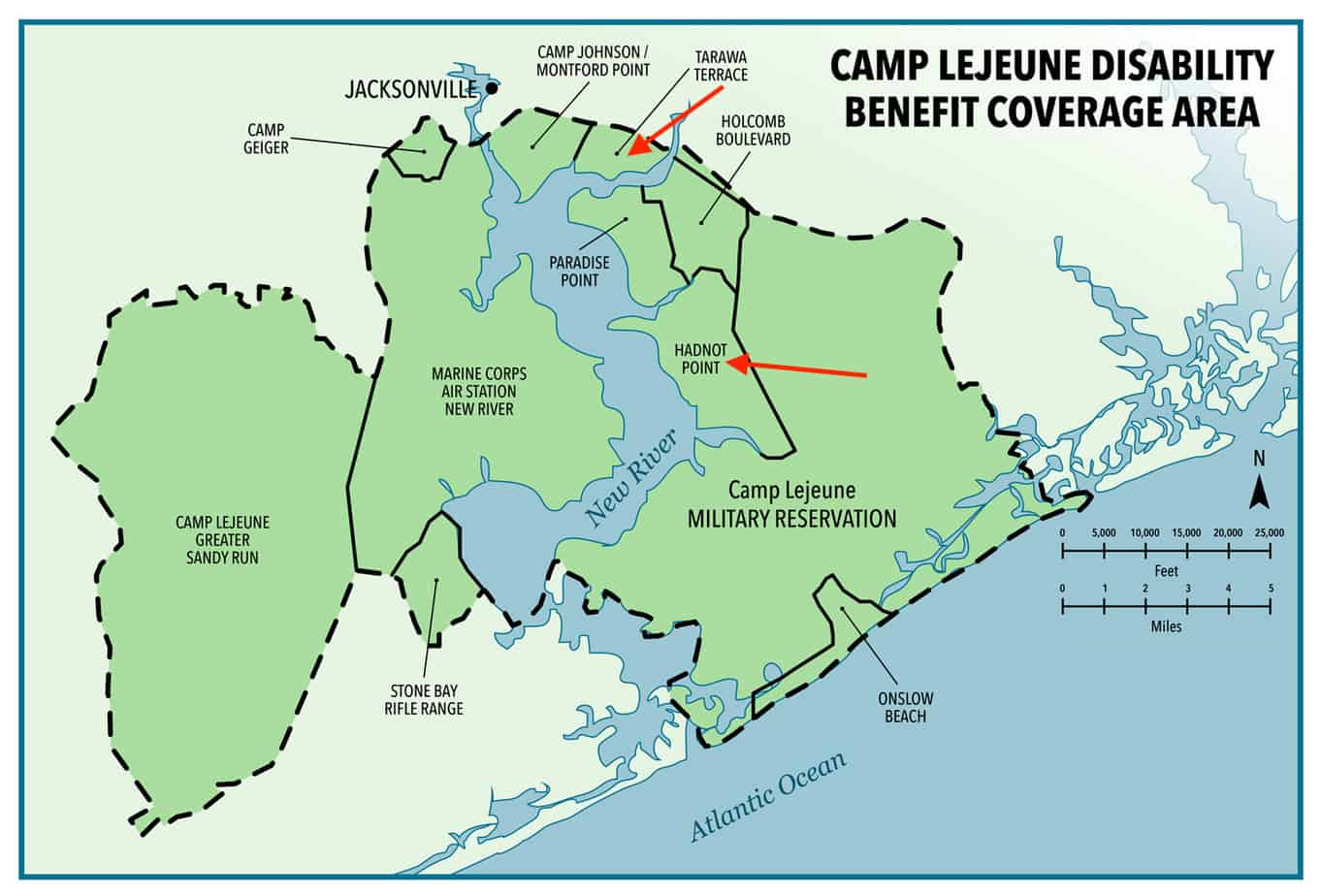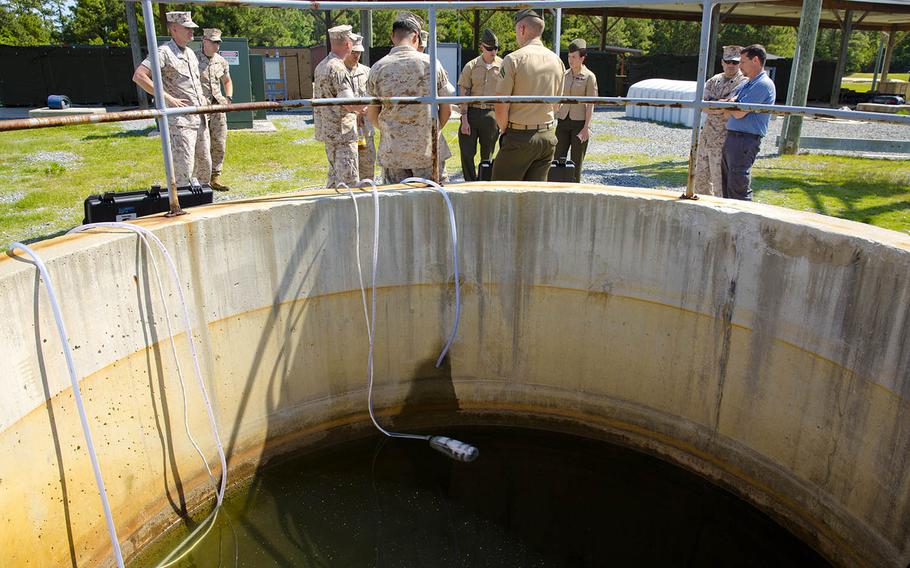Camp Lejeune, a military base in North Carolina, has been facing an alarming water contamination issue that has affected the health of many individuals living on or near the base. The contamination was caused by hazardous chemicals in the water supply, exposing the residents to various symptoms and diseases.
Camp Lejeune water contamination symptoms can be diverse, ranging from mild health concerns to severe and life-threatening conditions. Some commonly associated symptoms include hepatic steatosis, characterized by fatigue, weight loss, abdominal pain due to fat accumulation in liver cells, and neurological issues such as concentration problems, confusion, and coordination difficulties.
Other Camp Lejeune water contamination conditions are bladder and kidney cancers, leukemia, lung cancer, and myelodysplastic syndromes. People exposed to contaminated water should closely monitor their health and seek medical assistance if they notice any unusual symptoms to receive timely diagnosis and treatment.
Camp Lejeune History and Water Contamination
Camp Lejeune is located in North Carolina, a Marine Corps Base that has experienced significant water contamination issues. In the early 1950s, the contamination began, and it continued until several wells were shut down in 1985.
The source of the contamination was found to be the presence of volatile organic compounds (VOCs), specifically trichloroethylene (TCE) and perchloroethylene (PCE), in the base’s drinking water systems. These toxic substances are harmful, and prolonged exposure to them increases the risk of several health problems for the people residing on the base.
The Marine Corps discovered these VOCs in Camp Lejeune’s water supply in 1982. Further study revealed that the contamination significantly increased the probability of contracting multiple diseases. In response to the severity of the contamination, the Camp Lejeune Justice Act of 2022 was introduced as part of the PACT Act of 2022, Sec. 804.
Health issues related to the Camp Lejeune water contamination include:
- Bladder cancer
- Breast cancer
- Esophageal cancer
- Female infertility
- Hepatic steatosis
- Kidney cancer
- Leukemia
- Lung cancer
- Miscarriage
- Multiple myeloma
- Myelodysplastic syndromes
- Neurobehavioral effects
- Non-Hodgkin’s lymphoma
- Renal toxicity
- Scleroderma
Awareness of these health issues and seeking medical attention if symptoms arise is essential. Early detection and intervention can play a crucial role in managing the conditions.
Toxic Chemicals and Contaminants
Camp Lejeune water contamination primarily involved four toxic chemicals: benzene, trichloroethylene (TCE), vinyl chloride, and tetrachloroethylene (PCE). These chemicals were found in the water supply systems, particularly in the Tarawa Terrace and Hadnot Point water-treatment plants, which served military families and staff from 1953 to 1987.
Exposure to these chemicals can result in numerous health issues, with the severity and type depending on factors like the timing and duration of exposure and the specific chemical being ingested or inhaled. The following list highlights some of the critical health effects associated with each chemical:
| Chemical | Health Effects |
|---|---|
| Benzene | Leukemia, lung cancer, non-Hodgkin’s lymphoma |
| Trichloroethylene (TCE) | Kidney cancer, liver cancer, non-Hodgkin’s lymphoma, leukemia |
| Vinyl Chloride | Hepatic steatosis, angiosarcoma of the liver |
| Tetrachloroethylene (PCE) | Bladder cancer, esophageal cancer, kidney cancer, neurobehavioral effects |
Additional health conditions linked to Camp Lejeune water contamination include breast cancer, female infertility, miscarriage, multiple myeloma, myelodysplastic syndromes, renal toxicity, and scleroderma. In addition, veterans and civilians who lived and worked at the base during the affected period might be at risk for these conditions if exposed to contaminated water.
It is crucial for individuals who may have been in contact with the contaminated water to be vigilant with their health and seek medical attention if any symptoms emerge. Early detection and treatment can significantly improve outcomes for those affected by the toxic chemicals found in the Camp Lejeune water supply.

Health Effects and Symptoms of Contamination
Exposure to contaminated water at Camp Lejeune has been associated with various health problems. Some of the conditions related to the contamination include adult leukemia, aplastic anemia, bladder cancer, kidney cancer, liver cancer, multiple myeloma, non-Hodgkin’s lymphoma, Parkinson’s disease, and myelodysplastic syndromes.
Depending on the specific condition, individuals exposed to contaminated water might experience various symptoms. While some symptoms are shared among multiple health problems, others are more specific to individual conditions. Therefore, it is crucial to consult a healthcare professional if any of the mentioned symptoms are experienced.
Common symptoms of many conditions include fatigue, dizziness, headache, nausea, irregular heartbeat, and tremors. These symptoms can be chronic and require medical attention. Additionally, neurobehavioral effects such as confusion, memory loss, and difficulty concentrating have also been noted in individuals exposed to the contamination.
Aside from these general symptoms, specific conditions have their unique manifestations. For instance, bladder and kidney cancers may present symptoms such as blood in the urine, abdominal pain, and back pain. Liver cancer might lead to a swollen abdomen, jaundice, and unexplained weight loss. Multiple myeloma, a type of blood cancer, may cause bone pain, frequent infections, and kidney problems. In the case of non-Hodgkin’s lymphoma, enlarged lymph nodes, chest pain, and persistent cough are common symptoms.
Reproductive health has also been affected by the Camp Lejeune water contamination. Female infertility, miscarriage, and birth defects have been reported in those exposed to contaminated water. In addition, conditions like scleroderma, which affects the skin and connective tissues, and renal toxicity, involving kidney damage, have also been linked to exposure.
Anemia, or a decrease in red blood cells, is another common symptom that manifests across the abovementioned conditions. Individuals with anemia may experience weakness, shortness of breath, and pale skin. In some cases, the exposure to toxic chemicals at Camp Lejeune has led to aplastic anemia. This rare and potentially life-threatening condition causes the bone marrow to stop producing enough new blood cells.
Affected Populations and Eligibility for Support
The populations affected by the Camp Lejeune water contamination include veterans, active duty, National Guard members, and their families who lived or worked at Marine Corps Base Camp Lejeune between the 1950s and 1985. During this period, drinking water supplies were contaminated with hazardous chemicals, such as trichloroethylene (TCE) and perchloroethylene (PCE).
As a result of the contamination, those exposed may have developed presumptive conditions, negatively impacting their health. The Department of Veterans Affairs (VA) recognizes 15 covered health conditions related to Camp Lejeune water contamination. Eligible individuals can apply for disability benefits and receive support for these diseases.
Veterans and National Guard members at Camp Lejeune for at least 30 days during the affected period may be eligible for disability benefits. Additionally, their family members present during this time might qualify for healthcare benefits if they have developed one of the 15 covered conditions. The eligibility period for support extends from August 1, 1953, to December 31, 1987.
The 15 covered conditions related to Camp Lejeune water contamination are as follows:
- Bladder cancer
- Breast cancer
- Esophageal cancer
- Female infertility
- Hepatic steatosis
- Kidney cancer
- Leukemia
- Lung cancer
- Miscarriage
- Multiple myeloma
- Myelodysplastic syndromes
- Neurobehavioral effects
- Non-Hodgkin’s lymphoma
- Renal toxicity
- Scleroderma
Overall, those affected by Camp Lejeune water contamination, including veterans, active duty personnel, National Guard members, and family members, are encouraged to seek support and file claims if they meet the eligibility criteria and have developed one or more of the 15 covered conditions.
Compensation and Legal Actions
The Camp Lejeune Justice Act of 2022 allows victims exposed to the contaminated water at Camp Lejeune to file lawsuits for appropriate relief. Veterans, family members, survivors, and their legal representatives can file a lawsuit in the Eastern District of North Carolina for compensation related to any harm caused by this exposure. Issues associated with contaminated water include various cancers, immune disorders, and birth defects.
Veterans exposed to the contaminated water at Camp Lejeune and later developed symptoms or illnesses may be eligible for disability compensation from the Department of Veterans Affairs (VA). This includes compensation for conditions such as hepatic steatosis (fatty liver disease), which has been identified as one of the most common symptoms related to contamination.
Individuals seeking to file a claim for compensation with the VA should gather pertinent medical records and documentation supporting their claim. It is essential to provide evidence of residency, work, or other exposure to the contaminated water at Camp Lejeune for at least 30 days between August 1, 1953, and December 31, 1987. A thorough and well-documented claim can improve the chances of obtaining VA disability compensation or reimbursement for associated expenses.
In addition to VA claims, individuals affected by the Camp Lejeune water contamination may also consider participating in a class action lawsuit. Legal representatives specializing in Camp Lejeune cases can assist in pursuing compensation for injuries, illnesses, or the wrongful death of a loved one due to exposure.
The following conditions have been associated with the contaminated water at Camp Lejeune:
- Bladder cancer
- Kidney cancer
- Liver cancer
- Adult leukemia
- Multiple myeloma
- Non-Hodgkin’s lymphoma
- Aplastic anemia and other myelodysplastic syndromes
- Cardiac birth defects
- Parkinson’s disease
Seeking compensation and pursuing legal actions can be challenging. Still, the potential benefits can help to alleviate the financial burden of medical expenses and other costs associated with the health problems resulting from Camp Lejeune water contamination.
Prevention, Current Measures, and Future Perspectives
Several measures have been taken to prevent further health problems associated with Camp Lejeune water contamination. The Agency for Toxic Substances and Disease Registry (ATSDR) has been actively assessing the risks from hazardous substances in drinking water since the late 1980s. Shutting down the most contaminated wells in 1985 and continued monitoring has helped reduce exposure to toxic chemicals.
Healthcare benefits and VA disability benefits have been extended to affected individuals through the PACT Act. By providing medical support and compensation, veterans and civilians affected by the contamination can better manage their health problems, including kidney and liver damage, cancers, and other severe conditions.
As for future perspectives, addressing the long-term health consequences of exposure to volatile organic compounds (VOCs) found in contaminated water is essential. Some compounds, such as tetrachloroethylene and other degreasers, have been linked to illnesses affecting the central nervous system, kidney and liver damage, and cancers. Therefore, continued research and studies on the impacts of these contaminants are essential for better understanding the full scope of health effects.
Moreover, thorough documentation and analysis of military and medical records will play a crucial role in effectively treating and supporting those who have experienced exposure to toxic substances. Identifying symptoms early on and addressing potential health complications may lead to better outcomes for the affected population.
It is also vital to improve preventative measures against water contamination in the future, such as implementing stricter regulations and guidelines for water treatment and monitoring to protect the health of military personnel and the civilian population from similar incidents. This will help ensure better management of potential exposure to harmful chemicals and minimize the risk of long-term health problems arising from water contamination.
Frequently Asked Questions
What are some common symptoms associated with Camp Lejeune water contamination?
Individuals exposed to the contaminated water at Camp Lejeune may experience neurobehavioral effects such as anxiety, confusion, depression, headaches, insomnia, involuntary muscle movements, learning or memory problems, and tremors. Some may also face more severe health issues, such as certain types of cancer and Parkinson’s disease.
What are the 15 covered conditions related to Camp Lejeune water contamination?
- Bladder cancer
- Breast cancer
- Esophageal cancer
- Female infertility
- Hepatic steatosis
- Kidney cancer
- Leukemia
- Lung cancer
- Miscarriage
- Multiple myeloma
- Myelodysplastic syndromes
- Neurobehavioral effects
- Non-Hodgkin’s lymphoma
- Renal toxicity
- Scleroderma
How can I register to receive information about Camp Lejeune?
Former residents and employees of Camp Lejeune can register at the official Marine Corps water study website for notification and information regarding past drinking water contamination.



